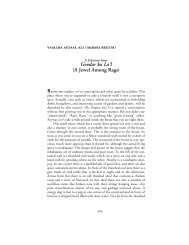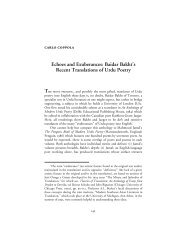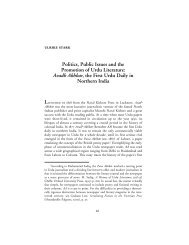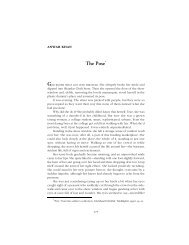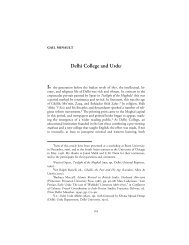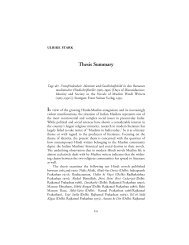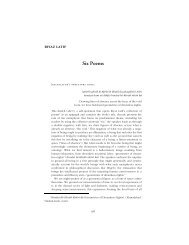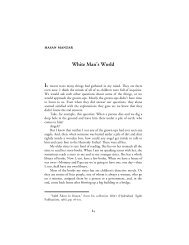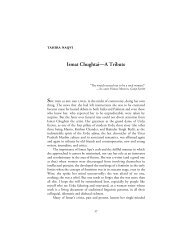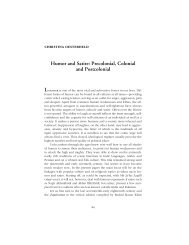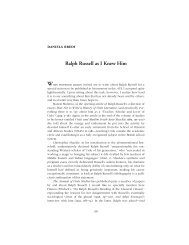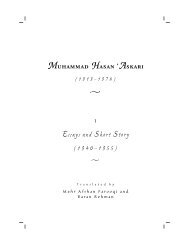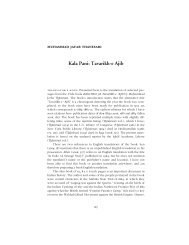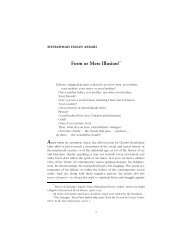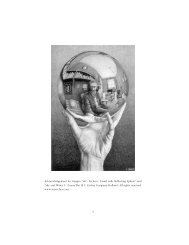Premchand's âShatranj ke Khilariâ in Translation - the Annual of Urdu ...
Premchand's âShatranj ke Khilariâ in Translation - the Annual of Urdu ...
Premchand's âShatranj ke Khilariâ in Translation - the Annual of Urdu ...
You also want an ePaper? Increase the reach of your titles
YUMPU automatically turns print PDFs into web optimized ePapers that Google loves.
200 • The <strong>Annual</strong> <strong>of</strong> <strong>Urdu</strong> Studies, No. 28<br />
seemed irreversible (ibid., 58).<br />
Faruqi quotes Premchandís public addresses made at <strong>the</strong> Arya Bhasha<br />
Sammelan <strong>in</strong> Lahore (1936) and <strong>the</strong> Daksh<strong>in</strong> Bharat H<strong>in</strong>di Prachar Sabha<br />
<strong>in</strong> Madras (1934) to establish that although he accepted <strong>the</strong> common orig<strong>in</strong>s<br />
<strong>of</strong> <strong>the</strong> two languages and advocated <strong>the</strong> use <strong>of</strong> a simplified H<strong>in</strong>dustani<br />
idiom which would stride Sanskritic H<strong>in</strong>di and Persianized <strong>Urdu</strong>, he too<br />
emphasized <strong>the</strong> foreignness <strong>of</strong> <strong>Urdu</strong> and swam with <strong>the</strong> tide (ibid., 21–22,<br />
62). Premchand specified that he was not concerned with <strong>the</strong> politics <strong>of</strong><br />
<strong>the</strong> s<strong>in</strong>gularity <strong>of</strong> Sanskritic H<strong>in</strong>di as <strong>the</strong> national language. He believed <strong>in</strong><br />
<strong>the</strong> essential closeness <strong>of</strong> H<strong>in</strong>di, H<strong>in</strong>dustani and <strong>Urdu</strong> and believed that<br />
l<strong>in</strong>guistic pluralism was <strong>in</strong> fact an <strong>in</strong>dication <strong>of</strong> <strong>the</strong> evolution <strong>of</strong> language<br />
(1967, 100–33).<br />
Premchand and Self-<strong>Translation</strong><br />
Dhanpat Rai Srivastava (Premchand), also known as Nawab Rai, began his<br />
literary career as a writer <strong>of</strong> <strong>Urdu</strong> fiction because <strong>Urdu</strong> was <strong>the</strong> prevail<strong>in</strong>g<br />
medium <strong>of</strong> literary expression dur<strong>in</strong>g much <strong>of</strong> <strong>the</strong> n<strong>in</strong>eteenth century. He<br />
had imbibed this tradition <strong>in</strong> <strong>the</strong> course <strong>of</strong> his education. By about 1900,<br />
his social and political awareness gradually matured <strong>in</strong>to a nationalist consciousness.<br />
However, from 1913–1915 he steadily gave up <strong>Urdu</strong> <strong>in</strong> preference<br />
for H<strong>in</strong>di (Rai 2002, 388). Dalmia observes that Premchand switched to<br />
publish<strong>in</strong>g his works <strong>in</strong> H<strong>in</strong>di early <strong>in</strong> his career, as H<strong>in</strong>di had a larger<br />
mar<strong>ke</strong>t (2010b, 494). Premchand confided <strong>in</strong> a letter addressed to Munshi<br />
Dayanarayan Nigam (26 June 1915) that he had got ìlittle benefitî from <strong>the</strong><br />
art <strong>of</strong> writ<strong>in</strong>g (qtd. <strong>in</strong> Gopal 1964, 108). Economically this was a lean period.<br />
Around <strong>the</strong> same time, he resumed study<strong>in</strong>g, negotiated tak<strong>in</strong>g over editorship<br />
<strong>of</strong> Zamāna, and sent out stories to both H<strong>in</strong>di and <strong>Urdu</strong> journals.<br />
He received greater appreciation from H<strong>in</strong>di periodicals, newspapers and<br />
journals and confided <strong>in</strong> Nigam: ìI th<strong>in</strong>k writ<strong>in</strong>g <strong>in</strong> <strong>Urdu</strong> wonít do. Li<strong>ke</strong><br />
<strong>the</strong> late Balmukand Gupta, I shall have to pass <strong>the</strong> last days <strong>of</strong> my life <strong>in</strong><br />
writ<strong>in</strong>g H<strong>in</strong>di. Is <strong>the</strong>re a H<strong>in</strong>du who has dist<strong>in</strong>guished himself <strong>in</strong> <strong>Urdu</strong>?<br />
And if none has succeeded, how can I?î (ibid., 113).<br />
Premchand self-translated short stories and novels on a regular basis,<br />
convert<strong>in</strong>g H<strong>in</strong>di and <strong>Urdu</strong> <strong>in</strong>to source and target languages. Such cont<strong>in</strong>ual<br />
exercises could have been prompted by <strong>the</strong> divergent systemic sociopolitical<br />
and cultural patterns and <strong>the</strong> diverse artistic and political objectives<br />
and priorities precipitated by <strong>the</strong> breakdown <strong>of</strong> <strong>the</strong> cultural and l<strong>in</strong>guistic<br />
syncretism <strong>of</strong> once related traditions. The cultural dom<strong>in</strong>ance and élitist<br />
nature <strong>of</strong> <strong>the</strong> already standardized <strong>Urdu</strong> <strong>in</strong> multil<strong>in</strong>gual nor<strong>the</strong>rn India could



